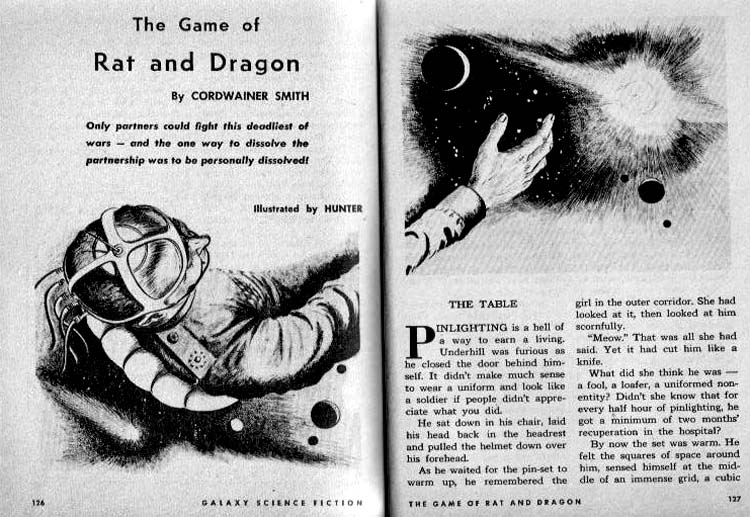Introduction to the story from The Ascent of Wonder
" Cordwainer Smith was the pseudonym of Paul Linebarger, a mysterious and colorful figure who was an expert on psychological warfare (he wrote a standard text) and spent his career in the Intelligence community. He went to college with L. Ron Hubbard, the famous pulp science fiction writer who later invented Scientology, and they published in the same literary magazine. There was apparently some real competitiveness in Linebarger, for he wrote an entire book manuscript (never published) in the late 1940s on the science of mental health. In typical hard sf fashion, both Linebarger and Hubbard were trying to raise psychology to the status of a "real" science.
Nearly all of Smith's science fiction takes place in a consistent future history, "The Instrumentality of Mankind," comprising many stories and one novel, Norstrilia (1975). The series chronicles events in the millennia-long struggle between the human Instrumentality and the Underpeople, intelligent animals biologically transformed into humanlike forms. A devout High Anglican, Smith built complex levels of religious allegory into his series.
As is evident from the foregoing, he was not characteristically an hard sf writer, but he did occasionally explore hard sf territory, although always in an highly ornamented style at the furthest remove from the traditional unornamented prose of scientific reportage normally identified with the "hard stuff."
"No, No, Not Rogov!" is his only sf story set in contemporary times. It is in the mode of invention fiction, but is set in the Soviet Union during the 1940s and beyond. It explores the work of science under totalitarian political conditions, a subject that Linebarger knew well. The setting reflects the ambiguous attitude toward the linkage of the military and scientific establishments that has characterized post-atomic bomb sf. The political/psychological portraits may be assumed to be accurate. It is also a link between the present and his visionary future of the Instrumentality.
The portrayal of experimental science is a chilling parallel to Tiptree's "The Psychologist Who Wouldn't Do Awful Things to Rats." And the portrait of the scientist as a partly-willing political prisoner is an ironic contrast to Kornbluth's "Gomez." It is a work that explodes into something visionary and transcendent and shows Cordwainer Smith's distinctive and unusual voice in sf."
3.5 out of 5
http://ebbs.english.vt.edu/exper/kcramer/anth/Rogov.html
 http://www.collectorshowcase.fr/images2/intgy_5510.jpg
http://www.collectorshowcase.fr/images2/intgy_5510.jpg
 http://www.collectorshowcase.fr/images2/intgy_5510.jpg
http://www.collectorshowcase.fr/images2/intgy_5510.jpg
 http://www.noosfere.org/images/auteurs/Smith-Cordwainer.jpg
http://www.noosfere.org/images/auteurs/Smith-Cordwainer.jpg